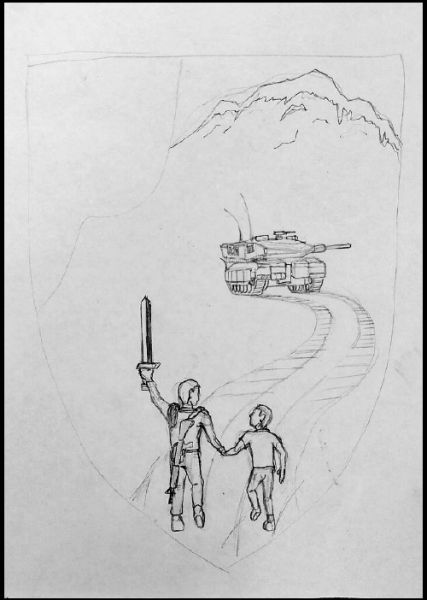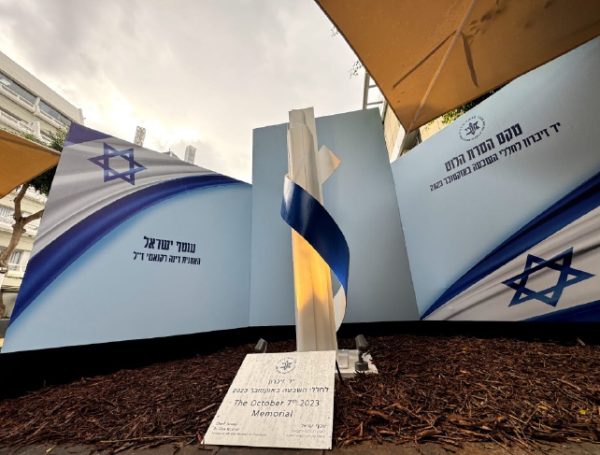By Leah Garber
“This is my final downfall and today destruction has begun. Everything happens from here on… A boat went ashore, this is the time of the flood, and everything will be washed away.”
Like a chilling prophecy predicting his death, this song was written by 24-year-old Captain Yahel Gazit who was killed this week in Gaza. Yahel, a talented musician, was supposed to be released from army service this week as a deputy company commander.
On October 7 he was no longer part of his regiment, but nevertheless he headed south to join the battles to liberate the besieged kibbutzim. With the beginning of the ground campaign, Yahel’s unit joined the armored forces in Gaza. A few weeks later, Yahel injured his leg. Before he was fully recovered, he insisted on returning to his unit to fight. Yahel’s older brother, Ido, a soldier also fighting in Gaza, received the news of his brother’s death while amid a battle. Last August, Yahel’s father passed away after a long illness, and Yahel had spent the last few months by his father’s side.
Twenty-three-year-old Captain Eitan Fish also was killed in battle this week. A talented artist, Eitan, left this drawing unfinished. It depicts an abducted child returning to Israel as a soldier holds a sword, the symbol of Eitan’s armored division, aloft.

Through this sensitive artwork, Eitan expressed the deep sense of mission with which he and his friends went into the harsh battles—to rescue the hostages, bring them home, and ensure peace and security for the citizens of Israel.
At his funeral, his father eulogized him this way:
Your grandparents were taken to Auschwitz and their family members were murdered by the Nazis. They had no army to free them and no country to go to. In the war that was imposed on us two months ago, you went into battle with a sense of mission, that you and the soldiers with you are protecting the country and us. I call on everyone to complete the work for which you paid, and we paid, a heavy price.”
Yahel and Eitan, two precious and beloved young men, flowers that were plucked in their prime. Their lives have ended; their talents will remain unfulfilled. They are among the 85 soldiers killed in battle since the beginning of the ground fighting. Each is an entire world with unrealized futures and dreams now left behind—eighty-five flowers in God’s garden that now will bloom forever.
Tonight, millions of Jews across the world will gather to light the first Hanukkah candle, commemorating the holiday. Among the hanukkiyot that will be lit are 138 that were placed at the Kotel, the Western Wall plaza in Jerusalem, recognizing the 138 hostages who remain captives of Hamas and don’t have a Hanukkah menorah to light to dispel the darkness that surrounds them. The largest menorah in Europe will be lit in the presence of Olaf Schulz, chancellor of Germany, at the Brandenburg Gate in Berlin, the very gate that symbolized the Nazi regime. All these Hanukkah lights will honor the heroic Maccabees, whose actions represented courage, determination, and belief in the rightness of our ways and triumph of the few over the many. Always few against many, we always prevailed.
Yesterday I attended a ceremony at Kfar Maccabiah, a resort hotel, conference center, and headquarters of the Maccabi movement, an important, longtime, and respected partner of JCC Association of North America. At the event, Maccabi inaugurated the first statue erected in Israel to commemorate the October 7 massacre.

From day one, the Maccabi movement directed all its resources to the humanitarian effort to rehabilitate numerous groups affected by the massacre and the war. The Kfar Maccabiah resort became a temporary, loving home for more than 1,000 people evacuated from southern towns.
The sculpture, “Enveloping Israel,” is the work of artist Dina Recanati, z”l, and was donated by her family to memorialize the events of that black Shabbat and, most importantly, to remind us that the people of Israel envelop the country, our homeland, with love, commitment, and dedication.
To overcome the current crisis, we recovered overnight from the divisions and disputes that had been part of our lives until October 6, mobilizing our passion, determination, and a sense of unity not seen here for decades. With Israel’s courageous soldiers, the Maccabees of 2023, we will prevail, because, as the lyrics of a well-known Hanukkah song for children says, “Every one of us is a small light, but together we shine bright.”
So tonight, exactly two months since October 7, we will stand by our Hanukkah candles as they join an endless chain of bright lights that will sparkle and shine from one home to the next, enveloping the entire Jewish world, connecting all Jewish hearts. In their light, we will sing in one voice the songs of the Maccabees and pray for a second Hanukkah miracle after nearly 2,200 years. Outside, gazing at the stars, we will see the heavenly light of Yahel, Eitan, and too, too many of their friends, hoping they will be the last to join the starlit sky above us.
The lyrics to Yahel’s song end this way: A bird might bring an olive leaf or a sign, a rainbow will appear in the gray sky… love will come, even if it takes some time.
Until then, we will be comforted by the light of the holiday candles, and we will know that together we shine bright!
Happy Hanukkah.
Leah Garber is a senior vice president of JCC Association of North America and director of its Center for Israel Engagement in Jerusalem.
Reader Interactions